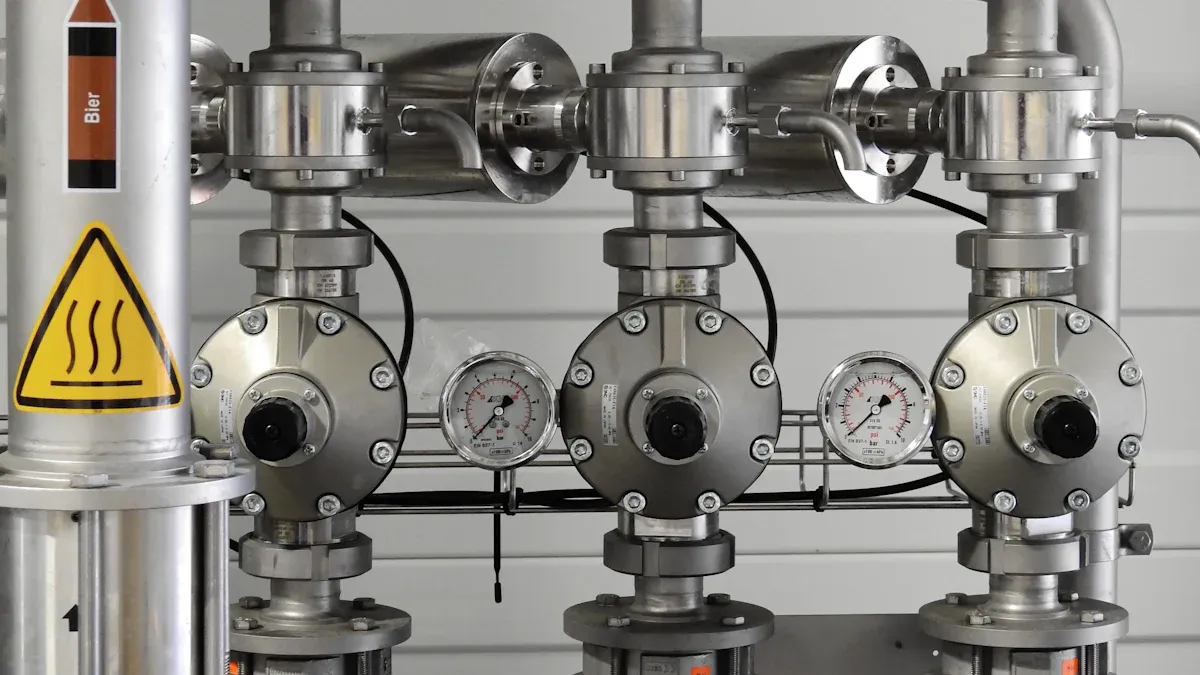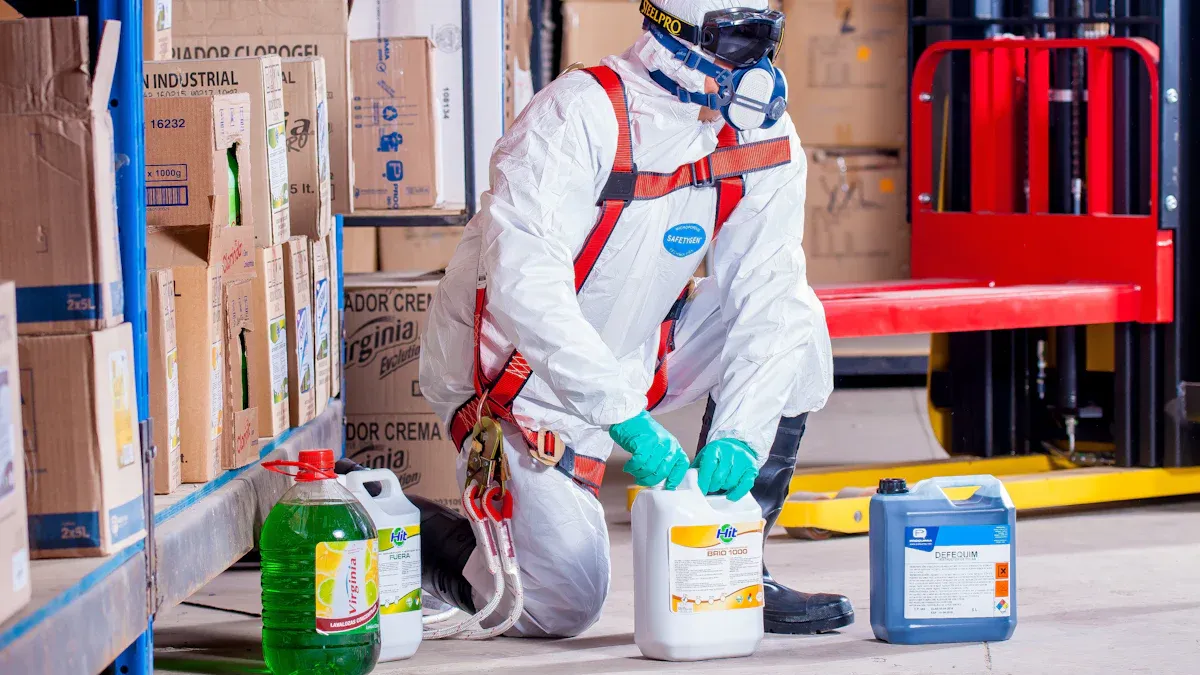Tel: +86-577-86801027 / E-mail: cooper@lianhevf.com
Stainless Steel Fitting
- All
- Product Name
- Product Keyword
- Product Model
- Product Summary
- Product Description
- Multi Field Search
Views: 0 Author: Site Editor Publish Time: 2025-10-14 Origin: Site

You need good protection in chemical processing. Stainless flange plates help stop leaks and keep dangerous chemicals inside. These plates do not rust or break easily. Workers are safer when you pick the right material for your tools.
Picking the right material keeps people safe and helps you follow rules.
Stainless flange plates stop leaks and keep harmful chemicals inside. This makes chemical processing safer.
These plates do not rust easily. This lowers the chance of leaks and means less fixing is needed.
Using stainless flange plates makes strong connections. They can handle high pressure. This helps stop bursts and accidents.
Checking the plates often and teaching workers well helps find problems early. This makes the workplace safer.
Adding flange guards and shields gives more protection. This helps keep workers safe from chemicals.
It is important to stop leaks in chemical plants. Stainless flange plates fit tightly between pipes and machines. These plates help keep chemicals from getting out. Using stainless flange plates makes leaks less likely. Leaks can cause dangerous spills.
Tip: Check your equipment often to find problems early.
Corrosion can damage metal and make holes. Stainless flange plates do not corrode easily. This means you do not have to worry about sudden leaks. Good resistance keeps your system safe and helps you avoid big accidents.
Chemical plants use strong acids and bases. Many metals get damaged by these chemicals. Stainless flange plates do not rust or get weak fast. You can count on these plates to last a long time.
Here is a simple table showing how materials react to chemicals:
| Material | Reaction to Chemicals | Risk of Corrosion |
|---|---|---|
| Carbon Steel | Weak | High |
| Regular Iron | Weak | High |
| Stainless flange plates | Strong | Low |
Choosing stainless flange plates helps protect people and machines. Plates that resist corrosion need fewer repairs. There is less chance of chemical exposure. Your plant stays safer, and you fix fewer problems.
You work in a chemical plant where pipes and tanks often hold liquids and gases under high pressure. If you use weak materials, these systems can burst or leak. Stainless flange plates give you strong connections between pipes. These plates do not bend or crack easily. You can trust them to hold tight even when pressure rises.
Many chemical processes need steady pressure to work safely. When you choose stainless flange plates, you help your system stay stable. These plates keep joints secure. You avoid sudden bursts that can harm workers or damage equipment.
Note: Always check pressure ratings before installing new flange plates. This helps you match the right plate to your system.
Here is a quick list of benefits you get from high pressure performance:
Strong seals that stop leaks
Less chance of pipe bursts
Safer working conditions
You want to lower the risk of accidents in your plant. Weak joints can fail and cause spills or explosions. Stainless flange plates help you avoid these problems. These plates resist damage from both pressure and chemicals. You get fewer breakdowns and less downtime.
If you use strong flange plates, you protect your workers and your machines. You spend less time fixing leaks or replacing broken parts. Your plant runs smoother and safer.
| Risk Factor | Weak Flange Plates | Stainless Flange Plates |
|---|---|---|
| Leak Probability | High | Low |
| Burst Risk | High | Low |
| Maintenance Needs | Frequent | Rare |
Tip: Regular inspections help you spot early signs of wear. Replace old plates before they fail.
You make your plant safer when you choose the right materials. Stainless flange plates give you peace of mind and help you meet safety goals.

You want to keep workers safe from dangerous chemicals. When you use strong connections, you lower the chance of leaks. Stainless flange plates help you create tight seals between pipes. These seals stop chemicals from escaping into the air or onto the floor. If you keep chemicals inside the system, you protect everyone in the plant.
You can follow these steps to limit chemical exposure:
Inspect all pipe joints often.
Replace worn or damaged plates right away.
Train workers to spot early signs of leaks.
Tip: Good training helps workers react fast if they see a problem.
When you use the right equipment, you make the plant safer for everyone. You also avoid costly cleanups and health risks.
You can add extra protection by using flange guards and shields. These covers fit around the flange area. If a leak happens, the guard catches the spray and keeps it from reaching workers. This simple step can stop burns, injuries, or chemical contact.
Here is a table showing how guards and shields help:
| Safety Feature | What It Does | Benefit to Workers |
|---|---|---|
| Flange Guard | Blocks chemical spray | Reduces injury risk |
| Flange Shield | Contains leaks | Keeps area cleaner |
You should check guards and shields during regular inspections. Replace them if you see damage. When you combine these tools with stainless flange plates, you build a strong safety system.
Note: Always choose guards made for the chemicals in your plant.
You want your chemical plant to work well. Using strong materials means fewer problems to fix. Stainless flange plates help you avoid many repairs. These plates do not rust or get damaged by chemicals. You do not have to change them often.
Here are some ways lower maintenance helps you:
You spend less money fixing things.
Your plant does not stop working as much.
Workers are safer from surprise leaks.
Tip: Check your equipment often to find small problems early. This easy step helps your system last longer.
If you pick good equipment, your job gets easier. You do not worry as much about things breaking. Your team can do other important jobs.
You want your plant to last a long time. Strong parts help you reach this goal. Stainless flange plates protect your pipes and machines. These plates can handle strong chemicals and high pressure. Your system stays strong for many years.
Look at this table to see how material choice changes how long things last:
| Material Type | Expected Lifespan | Maintenance Frequency |
|---|---|---|
| Basic Steel | Short | High |
| Coated Iron | Medium | Medium |
| Stainless flange plates | Long | Low |
You get more for your money with strong materials. Your plant stays safe and works well. You do not have to replace things as often.
Note: Always read the manufacturer’s rules for how long parts last. This helps you know when to plan upgrades.
When you use good parts, your plant is safer and stronger. You keep your workers and your business safe for a long time.
You have to follow strict rules in chemical plants. These rules keep workers and nature safe. Stainless flange plates help you follow these rules. Many safety codes want strong materials that do not rust. Stainless flange plates can pass safety checks.
Inspectors look for safe pipe connections in your plant. They check for leaks, rust, and weak spots. Using stainless flange plates shows you care about safety. It also helps you pass safety checks more easily.
Here is a table that shows how stainless flange plates help with rules:
| Requirement | How Stainless Flange Plates Help |
|---|---|
| Leak Prevention | Tight seals, less risk of spills |
| Corrosion Resistance | Fewer failures, longer life |
| Pressure Handling | Strong joints, safer systems |
Tip: Always keep notes about your equipment and checks. Good notes help you show you follow the rules.
You want your plant to be safe every day. Using good materials helps stop accidents. Stainless flange plates make strong and safe pipe connections. You lower the chance of leaks or bursts.
Safe plants mean fewer injuries and less time stopped. You protect your workers and your business. Inspectors also want to see safe work. Using good parts shows you follow the best ways to work.
Here are steps you can take to keep your plant safe:
Check flange plates often.
Teach workers to find problems.
Change broken parts fast.
Note: Following rules keeps your plant safe and helps you avoid trouble.
You build trust with your team and inspectors. Good rule-following means your plant works well and stays safe.
You make your plant safer when you pick stainless flange plates. These plates help stop leaks and last a long time. They also help protect workers from harm. You can make things even safer by using good habits:
| Best Practice | Description |
|---|---|
| Proper Handling | Keep parts in clean, dry spots. Use soft tools so you do not scratch them. |
| Surface Preparation | Clean and treat surfaces before welding. This helps stop rust. |
| Welding Procedures | Have skilled welders do the job. Use special gas to cover the welds. |
| Regular Inspection | Look at plates often to find leaks or rust early. |
| Preventive Maintenance | Clean and care for plates on a set plan. Teach your team how to handle them safely. |
If you follow these steps, your plant will be safe and work well. You can ask experts for more ideas that fit your plant.
Stainless flange plates do not rust easily. They also do not get damaged by chemicals. Regular steel plates can rust fast. Stainless plates last longer. They help stop leaks.
Check flange plates every few months. Look for rust, leaks, or damage. Early checks help you find problems soon.
Yes, stainless flange plates stay strong under high pressure. They keep pipe joints tight. This helps stop bursts and leaks.
Clean stainless flange plates with mild soap and water. Do not use strong chemicals. Regular cleaning helps plates last longer.
Most safety rules want you to use stainless flange plates. These plates help stop leaks and rust.
Tip: Always check your local safety rules before picking materials.